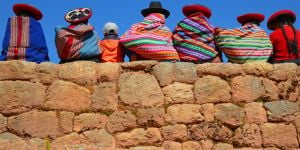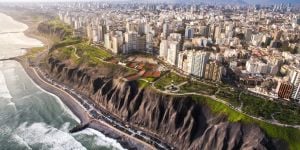
Arequipa, Peru's ‘white city' named for its beautiful white colonial architecture, is the second most industrialised and commercialised city in the country. The capital city of the region bearing the same name, Arequipa can be the ideal destination for foreign nationals in search of new career prospects in a Latin American city.
If you're considering settling there to work, it's best to research the labour market beforehand. Depending on your skill set, industry experience, and Spanish proficiency, you may have a better chance being hired by a foreign company, as is the case in the rest of Peru.
Economy
Arequipa is the second most populous city with over 860,000 inhabitants ' a modern and dynamic hub. The city's economy mainly relies on the manufacturing and export industries, producing goods related to the primary sectors, in particular textiles and agriculture. The city has strong trading ties with Chile, Bolivia, and Brazil, and domestically is an important connection between the coast and the Andes. Mining is also a big contributor to the economy, with the large-scale Cerro Verde mine nearby, among others. Tourism is also a growing sector, and Arequipa is now the third most visited city after Cuzco and Lima, with visitors drawn to the sights of the beautiful colonial 'white city' and the nearby Colca Canyon.
Good to know:
Arequipa is known to be Peru's second-biggest industrial city thanks to the presence of several industrial parks that were developed after a series of earthquakes in the early 1960s. The Arequipa Industrial Park (Parque Industrial de Arequipa), for instance, hosts mainly big and medium enterprises, ranging from food and beverages to construction, chemical, and export products, with more than 150 companies. The APIMA Industrial Park (Parque Industrial APIMA) is dedicated to small businesses and enterprises. Others include the Rio Seco Industrial Park and a few smaller ones. These industrial parks have helped foster the successful manufacturing and export industry and contributed to Arequipa having the highest rate of employment in all of Peru.
Labor market
Given Arequipa's diversified economy, career prospects are available in several fields, namely manufacturing, construction, engineering, trade, sales, management, services, etc. With local companies, Spanish is usually essential.
For those with weak or non-existent Spanish, tourism is a good industry to try, as is education, with a need for English teachers in the school system and also as private tutors for children and adults.
Note, however, that you must have the relevant qualifications and skills that are not currently available in the country to be hired in Arequipa. University certificates and other qualifications must be legalised by the country that issued them. In fact, Peruvian companies are more keen to recruit local employees because of the long and complex formalities for hiring foreigners.
Finding a job in Arequipa
The easiest way to find a job in Arequipa is to browse offers online. There are several specialized job websites and professional social networks for job seekers. A strong expatriate community has built up in the city over the years, and networking may also help if you have contacts or friends in the city. Word of mouth and personal recommendations go a long way in Peru.
Consider sending speculative job applications and enquiries to local and foreign companies operating across the city as well, showcasing your skills and what you can offer. You can find a list of these companies in local directories or with the local Chamber of Commerce and Industry as well. Having a good knowledge of Spanish will be a considerable advantage during your job search, and will be essential for many positions.
Useful links:
Arequipa Chamber of Commerce and Industry ' Directory of companies
Bumeran
BuscoJobs
Indeed
Career Jet
Expat Jobs in Peru Facebook page
We do our best to provide accurate and up to date information. However, if you have noticed any inaccuracies in this article, please let us know in the comments section below.








